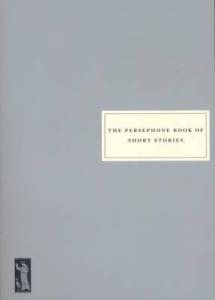As I believe I said in an earlier post, Patty was born into a well-to-do family in the early twenties of the twentieth century. How it became a well-to-do family is, at least partly, as a result of the American Dream.
My great-grandfather had the Dickensian name of Sam Weller. His father was a tollgate-keeper and Sam was one of several children. Oral history has it that Sam and his half-blind donkey started by making clay flower pots. In reality, he opened a small pottery, making clay flower pots but whether there was really a half-blind donkey isn’t mentioned in the official files. After several years, he and his young bride, Minnie, moved to the ‘big city’ or, actually Zanesville, which was a nearby town of a reasonable size. Minnie, along with her sisters – all fine seamstresses – set up as dressmakers while Sam grew his pottery business. After just a few years, the Weller Pottery was big enough that Minnie no longer had to work. The pottery grew and prospered, branching out into decorative items as well as flower pots. Sam and Minnie’s family also grew. In 1896, Louise was born and two years later, Ethel – Patty’s mother – came along. The family lived in a wonderful house on Market Street which I remember with great fondness. In 1900 Sam was the first man in Zanesville to own and drive a car in the town.
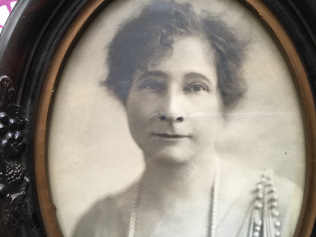 Great Grandmother Weller
Great Grandmother Weller 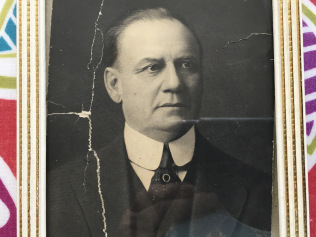 Grandfather Sam Weller
Grandfather Sam Weller
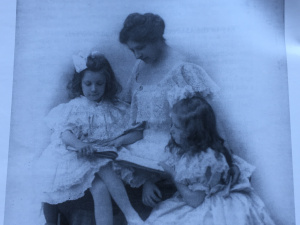
Great Grandmother Weller reading with daughters Louise and Ethel
My other great-grandparents were also well-to-do. Alexander Grant owned a large store in Zanesville. His second son, Frederic, went west to Puget Sound to seek his fortune in 1883. He must have visited Zanesville at least once after that because, in 1887 he married Bessie Hoge, daughter of one of the first telegraph operators in Zanesville and she returned to Seattle with him. At that time he worked as a journalist and was the editor of The Post Intelligencer in Seattle as well as becoming the president of the Seattle Street Railway Company and also going into politics, becoming the first US senator from the new state of Washington. Some time after leaving the Senate, he was made the minister to Bolivia (something like an ambassador, I assume) and lived in Bolivia with his wife for about a year but poor health meant he had to resign his post and the two went back to Seattle. There, he resumed his political life as well as the editorship of the newspaper. In 1894, Bessie stayed home because she was pregnant while Frederic went on a voyage on a sailing vessel, The Ivanhoe, hoping to build up his health. The Ivanhoe sank and Frederic II’s dad was lost at sea at the age of only thirty-two. Bessie and her baby son moved back to live near her family in Zanesville after some time.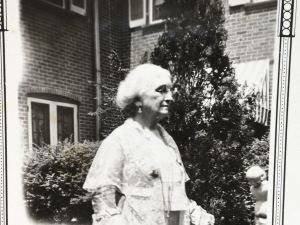
Great grandmother Grant
My grandmother Ethel was a beautiful and intelligent young woman in the days when beauty in a woman was seen as something very desirable while intelligence, if not definitely frowned upon, was discouraged. She was educated at home, probably taught sewing, drawing, a little French, a smaller amount of latin, basic numbers and reading. She became partially deaf – perhaps through a childhood illness or, as was handed down via oral tradition, through standing too close to the booming sound of a ship’s horn when on a transatlantic voyage.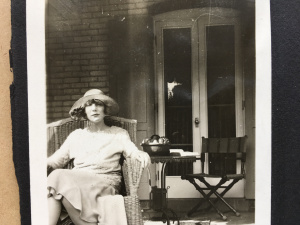
Grandmother Ethel Weller
My grandfather, Frederic II, was a good-looking and intelligent young man. He went to Yale, became a Captain in the Balloon Corps during WWI and married Ethel in June, 1921.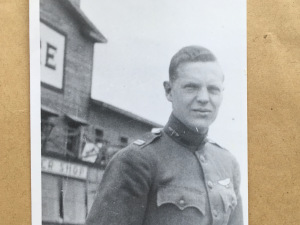
Grandpa Grant (Fred II) in Balloon Corps uniform
In November, 1922, Patricia Belle Grant was born.Finally, I hear you sigh!
Patty was good-looking and intelligent, like her mother. She grew up surrounded by fine objects, beautiful clothes, and a governess. The governess, Miss Keller, according to Patty, was horrible. If Patty couldn’t eat because she felt sick, Miss Keller would force the food into her mouth and hold her lips closed until she swallowed. I’m not sure how long Miss Keller lived with Patty but she definitely caused some of Patty’s later anxieties.
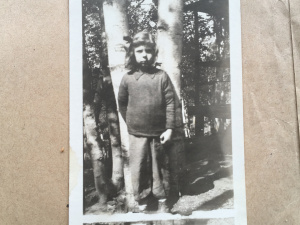
Patty as quite a young child
Patty went to the local elementary school, played and had adventures with the local children. One story I can remember occurred during prohibition when Patty and her friend, also named Patty, I think, went around looking through people’s windows for signs of ‘hooch’ making. In one cellar they spotted lots of empty glass bottles which they decided must have been collected to be filled with illicit alcohol. I think they rushed to tell their parents who did what parents normally do when their children come to them with outlandish stories – nothing.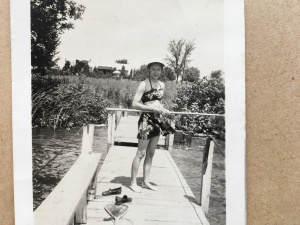
Patty as a teen-ager. I’m not sure whether she is in Ohio or California in this photo.
Fred and Ethel divorced sometime in the early thirties, after their son, Frederic III, was born. Patty stayed with her mother in Zanesville while she was at primary school but seems to have gone to live with her dad in Los Angeles and went to the Douglas girls’ boarding school where she studied and also learned to ride and play polo and learned to shoot a rifle. When she left the Douglas school she went to Smith College in Massachusetts but was only there for a year before she got married.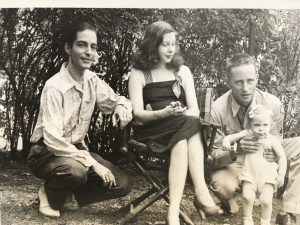
Patty with my father on the left, my uncle and me as a baby.
My mother was very bright and should never have had children! She should have stayed at Smith, gone on to an academic life, started painting, perhaps, or writing. She never really knew what she should do with her life and, after two divorces and three daughters, decided she would come to England and work as an architect for the US Navy.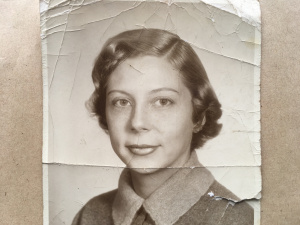
Patty around 1956
( I wish I had bothered to sit and listen to my mother’s stories when I was younger but I had ‘stuff to do’ – as most young people have – and, by the time I would have appreciated and taken in the history of my mother, it was too late. From my thirties onward I began to feel a great antipathy towards her (with good reason!) which really lasted until she died when I was just entering my seventies, at which point it was too late anyway, as her memory was full of holes.)Part two soon!
Share this:- More





